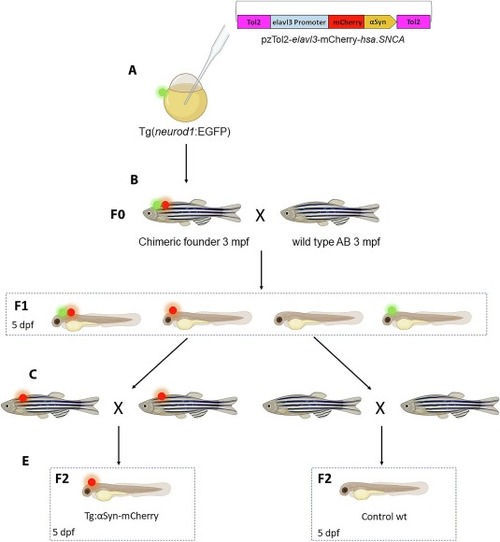Fig. 1
- ID
- ZDB-FIG-250820-22
- Publication
- Zini et al., 2025 - A novel stable transgenic zebrafish line expressing mCherry-tagged human alpha-synuclein in the nervous system and exhibiting all the key features of Lewy body disorders at larval stage
- Other Figures
- All Figure Page
- Back to All Figure Page
|
Generation of transgenic Tg(elavl3:mCherry-hsa.SNCA) and control lines. Schematic representation of the breeding procedure used to obtain the F2 and control larvae to perform all experiments. (A) 600 ng/μL of pzTol2-elavl3-mCherry-hsa.SNCA and 250 ng/μl of Tol2 mRNA were injected into embryos at one-cell-stage of the transgenic line Tg(neurod1:EGFP). (B) At 3 months post fertilization (mpf) chimeric animals that showed expression of both mCherry-αSyn (red dot) and EGFP (green dot) were crossed with wild-type AB fishes: parents able to transmit the transgene were selected as founders (F0) and were outcrossed with AB fishes to obtain F1 generation in which four phenotype were present: Tg(neurod1:EGFP)+ / Tg(elavl3:mCherry-hsa.SNCA) + larvae showed both green and red fluorescence, Tg(neurod1:EGFP)+ / Tg(elavl3:mCherry-hsa.SNCA)- larvae showed only green fluorescence, Tg(neurod1:EGFP)- / Tg(elavl3:mCherry-hsa.SNCA) + larvae had only mCherry-αSyn expression, while the Tg(neurod1:EGFP)- / Tg(elavl3:mCherry-hsa.SNCA)- had no fluorescence expression or transgenic construct integrated in the genome. (C) F1 Tg(neurod1:EGFP)- / Tg(elavl3:mCherry-hsa.SNCA) + (red spot) and Tg(neurod1:EGFP)- / Tg(elavl3:mCherry-hsa.SNCA)- (no spot) were selected and brought to adulthood: at 3 mpf they were inbred to generate the F2 larvae used for this study (D). (For interpretation of the references to colour in this figure legend, the reader is referred to the web version of this article.) |

